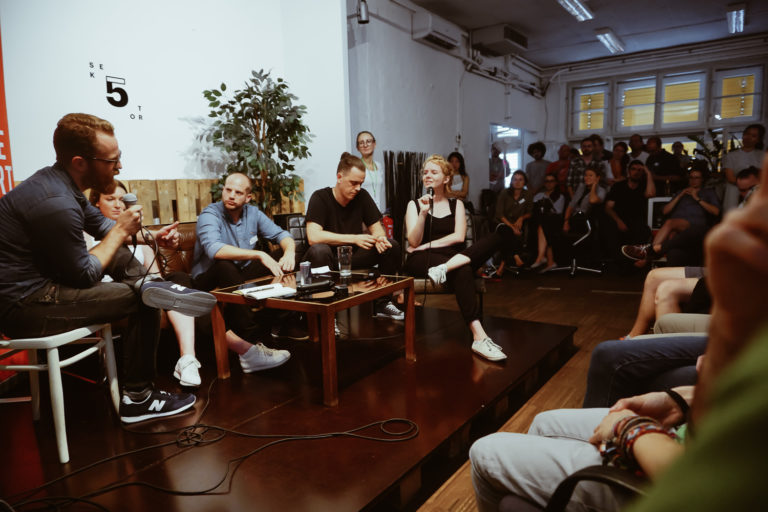Have you ever found yourself in a strip club after a business meeting? This month’s Stammtisch focused on identifying and questioning outdated and often sexist business practices within startup and business culture in general.
But first, let’s talk about the two important announcements of this Stammtisch. CEO and Editor in Chief of Metropole, Maggie Childs joined the board of AustrianStartups. Chances are you have already seen her at a Stammtisch before. On stage or in the crowd. We’re glad to have this experienced member of the startup community on board. Welcome Maggie!
The second one is the newly released Austrian Startup Code of Conduct, which aims at providing a set of rules for a startup environment that has grown tremendously and is attracting a lot of new people. With this the Austrian startup community is taking a clear stand against unethical behavior. So check it out and give your pledge if you want to contribute to a professional and healthy startup environment in Austria. We want your support!
That being said, here’s a quick rundown of this month’s Stammtisch topic and highlights.
Bro!
So why choose this topic and simultaneously release a code of conduct? Recent press coverage about issues at well-known international players of the startup ecosystem, such as Uber or 500 Startups has shown that there is still a lot of room for improvement in our society. Especially diversity and gender wise. And this month’s speakers definitely had their fair share of experiences that support that claim – inside and outside of the startup scene.
“I know companies, typical old large-scale Austrian enterprises that have Christmas parties and afterwards everybody goes to the strip club. And it’s completely normal.”, Andreas Klinger from Product Hunt mentioned. “As a woman in a managing position you end up having to meet with people in those positions and they tend to be men. And then you get invited by one of them to a Stammtisch and then they tell you that you can’t come because you’re a girl. I’ve had this said to me three times and they were not even ashamed about it.”, Maggie Childs from Metropole added.
And often these things tend to manifest beyond the settings of company-get-togethers. “I see a lot of old male founder teams and they go on to hire more white men and this doesn’t really stop. And when they’re already a team of 20 white men and they start talking about adding diversity to the team or they can’t find a man to fill the position, then they start thinking about hiring a woman. And when you join this team and it’s very alpha male-ish, with a foosball table in the office and “beer drinking Fridays” it’s not going to be a very welcoming environment.”, Floor Drees from sektor5/5starts explained.
“I used to work for big corporations in Salzburg before I founded my own company. And we used to call it a Nudelsuppen or sausage fest because the majority of people working there were men.”, Johann Rath from TableConnect recalled.
So how can we as a community move towards a diverse and fair working environment? We need to outline the benefits of diversity and speak up about sexism and harassment.
When Maggie asked the crowd if they had witnessed sexism at their workplace several hands were raised. But the following question about who spoke up about it was met with a considerably smaller amount of hands. “And that’s what we can do. Talk about it. I think that’s a big step in the right direction. All of you would have made a difference by speaking up.”
“Language is also very important. The language you use in your marketing and your external communication in general. It’s a powerful thing and you need to think about what you’re putting out there. And you also need to know how to speak up if you’ve witnessed something. So a collective understanding of how to talk about these issues is also very important.”, Floor added.
The right amount of “faking it”
Every entrepreneur has probably tweaked the truth a bit to buy more time or gain a slight advantage at some point. But every one of us also probably knows a story about a startup that turned out to be much less than expected. So where’s the line when it comes to “fake it ‘till you make it”?
The story of Johann Rath’s TableConnect is an exemplary tale of when “faking it” turns into an actual product. Originally planned as a funny video, Johann and his colleagues uploaded a video of an iPhone connected to a table and turning it into touch-surface. The video went viral, leading to global media coverage. There were plenty of interview and acquisition requests and after rejecting offers for two years for obvious reasons, they decided to actually make TableConnect. Nonetheless, a lot of stories remain where “faking it” a bit too much ended badly for investors and founders alike. So what is ok and what is not when it comes to one of startup cultures most famed platitudes?
“There’s a huge difference between faking something and having a vision. If you’re fundraising, you’re raising for something you will build in the end. It might not be there yet but that’s ok. But there is a fine line for sure. Faking it by not doing a life demo but recording it is fine but having a bot vote for your startup at a competition is not.”, said Floor
“I know so many landing pages that pretend to be an actual product and pretend to have customers. But as long as it’s not fraud the market will decide. But if you need a little bit of bullshit like smart wording, why not?”, Andreas noted.
So what should you take away from this month’s Stammtisch?
Obviously, that we’re living in the 21st century. Be mindful of how your work environment is developing, celebrate diversity and equality, openly communicate about these things and most importantly, speak up about harassment and toxic behavior in your workplace. Oh, and don’t overdo the whole “faking thing”. Nobody likes fraud.
See you at the next Stammtisch!
Speakers: Floor Drees: MD – sektor5/ 5starts, Maggie Childs: CEO and Editor in Chief – Metropole, Andreas Klinger: CTO – Product Hunt and Johann Rath: CEO – TableConnect Moderator: Daniel Cronin





